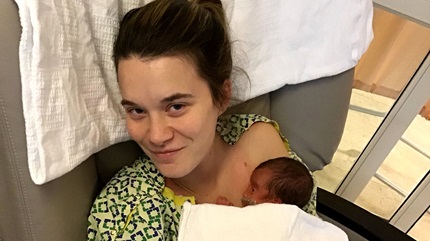Overview
The Division of Maternal-Fetal Medicine at Cleveland Clinic is committed to providing the highest quality, expert care to women with high-risk conditions. Our Maternal Fetal Medicine team provides comprehensive high-risk obstetric care, including preconception consultation, ultrasonography and advanced fetal imaging, perinatal diagnostics and fetal therapy, prenatal care and consultation, and delivery services. We partner with pediatric and adult medical subspecialists, genetic counselors, and nurse coordinators in specialized interdisciplinary programs including maternal cardiac disease in pregnancy, neurovascular disorders in pregnancy, perinatal diabetes, placenta accreta spectrum and advanced surgical obstetrics, reproductive genetics, and complex fetal care and fetal therapy.
Our division has nationally recognized leaders with expertise across the broad spectrum of maternal and fetal medicine, including maternal chronic disease and critical illness, placental complications, perinatal genetics and diagnosis, fetal therapy, and obstetric quality and safety. We provide patient-centered, culturally competent, and compassionate care and guide patients and families through the challenges of complex pregnancies. Through collaboration with our Center for Infant and Maternal Health, we are focused on eliminating barriers to care, reducing preventable maternal and perinatal morbidity, and ensuring equal access to healthcare. We have a valuable partnership with our Ob/Gyn specialists and midwives and utilize an obstetric care team approach during pregnancy and labor and delivery.
With active research and our MFM Fellowship, we are also committed to advancing obstetric care and training future generations of experts, innovators, and leaders in our field.
Our Centers
Fetal Care Center
Cleveland Clinic has established the Fetal Care Center to help mothers achieve the best possible outcome when a pregnancy is complicated by a maternal, fetal or obstetric disorder. Staff view the fetus as a patient, while respecting the health and well-being of the mother, which always remains the primary objective. When fetal anomalies (birth defects) are detected, we offer interdisciplinary diagnosis, counseling and treatment options at our children’s hospital.
Cardio-Obstetrics
Cardiac disease remains one of the leading causes of pregnancy-associated maternal morbidity and mortality in the United States. The Cardio-Obstetrics Program at Cleveland Clinic provides comprehensive preconception and pregnancy care to women and birthing persons with congenital and acquired heart disease.
Through uniting renowned experts in maternal-fetal medicine, cardiology, cardiothoracic surgery, cardiothoracic and obstetric anesthesiology, neonatology and pediatric cardiology, cardiovascular and perinatal genetics, advanced cardiac imaging, and nutrition, our program provides individualized, interdisciplinary care for patients with complex cardiac disease who are pregnant or contemplating pregnancy, thereby optimizing maternal and neonatal outcomes and minimizing pregnancy-associated risks. Our program has dedicated Perinatal Coordinators who provide education and resources to help patients navigate their care from pregnancy through delivery and the postpartum period.
The Special Delivery Unit at our main campus provides a delivery setting where state-of-the-art cardiovascular and obstetric care is provided during delivery and the immediate postpartum period, which is often the highest risk time for women with complex cardiac disease in pregnancy. In addition, given the impact of pregnancy-related hypertension on long-term cardiac and metabolic risks, our program houses a dedicated postpartum clinic to facilitate ongoing care after delivery and reduce long-term cardiovascular risks.
A sample of conditions we treat in preconception, pregnant, and postpartum patients includes:
- Congenital heart disease.
- Heart Failure or cardiomyopathy.
- Pericarditis and myocarditis.
- Coronary artery disease.
- Abnormal heart rhythms.
- Cardiovascular genetic abnormalities that increase risk for future heart disease.
- Cardiovascular dissections or aneurysms.
- Pulmonary Hypertension.
- Abnormal heart valves.
- Prior cardiac surgery.
- History of cardiac transplantation.
- Postpartum Heart Clinic: to reduce future risk of heart disease in postpartum persons.
Program Directors
- Cardiac Director: Joanna Ghobrial, MD.
- Obstetric Director: Katherine Singh, MD.
Program Coordinators and Contact Information
- Deborah Toth, BSN, RN.
- Samantha Nedlik, BSN, RN.
- For appointments or more information please call: 216.444.9706.
Neurovascular Obstetrics
Pregnancy may impact the course and treatment of preexisting neurologic and neurovascular disorders. Additionally, neurovascular disorders may complicate pregnancy and the peripartum period and increase the risk of a patient experiencing an adverse maternal or perinatal outcome. As such, patients who are pregnant or planning pregnancy and who have underlying neurologic or neurovascular disorders have unique care needs and considerations.
At the Cleveland Clinic Cerebrovascular-Obstetrics clinic, we utilize an interdisciplinary team-based approach to optimize care from preconception through pregnancy, delivery, and the postpartum period. Our team includes subspecialists from Maternal Fetal Medicine and Cerebrovascular Neurology as well as advanced cerebrovascular imaging, cardiovascular genetic counseling, neurosurgery, neonatology, anesthesiology, psychiatry, and pediatric subspecialists. We have dedicated nurse coordinators who help provide guidance and support to navigate pregnancy. We account for each patient’s individual needs to provide evidence-based patient-centered care, with a focus on patients with a history of the following conditions:
- Stroke (ischemic or hemorrhagic) or TIA.
- Cerebrovascular dissection.
- History of cerebral venous sinus thrombosis.
- Cerebral aneurysms.
- Genetic conditions that increase the risk for aneurysm, stroke.
- Reversible cerebral vasoconstrictive syndrome (RCVS).
- Posterior reversible encephalopathy syndrome (PRES).
- Moyamoya.
Program Directors
- Obstetric Director: Katherine Singh, MD.
Program Coordinators and Contact Information
- Deborah Toth, BSN, RN.
- Samantha Nedlik, BSN, RN.
- For appointments or more information please call: 216.444.9706.
Perinatal Diabetes and Nutrition
Diabetes and obesity are two of the most common co-morbidities that can lead to complications during pregnancy for both parent and baby. Optimizing glycemic control, diet, and weight before pregnancy can improve pregnancy outcomes.
The Center for Diabetes, Obesity, and Nutrition in Pregnancy at the Cleveland Clinic brings together a multidisciplinary team to care for patient’s metabolic health from preconception, through pregnancy and the postpartum period. Our goal is to ensure patients with underlying metabolic conditions have a healthy pregnancy through coordinated care by our team including experts from Maternal Fetal Medicine, Endocrinology, Obesity Medicine, Pharmacy, and Nutrition. The Center includes programs that educate and care for patients with type 1 diabetes, type 2 diabetes, gestational diabetes, obesity and other metabolic disorders, as well as programs focused on healthy eating and nutrition for all pregnant patients.
Maternal-Fetal Medicine Specialists
- Stacey Ehrenberg, MD.
- Cara Dolin, MD, MPH.
- Jodi Meridieth, APRN, WHNP-BC.
Endocrinologists
Clinical Pharmacists
- Diana Isaacs PharmD, BCPS, BCACP, BC-ADM, CDCES.
- Kevin Malloy PharmD, BCPS.
Dietitians
- Hillary Hart, RDN, LD, CDCES.
- Amy Wolf, MEd, RD, LD, CDCES.
Placenta Accreta Spectrum and Advanced Surgical Obstetrics
The Program for Advanced Surgical Obstetrics at Cleveland Clinic provides coordinated, multidisciplinary obstetric and surgical care for patients with placenta accreta spectrum, a complex surgical history impacting pregnancy, or those anticipated to have a complicated cesarean delivery or require additional surgery in conjunction with delivery, including hysterectomy. Our goal is to achieve a safe delivery and optimize maternal and neonatal outcomes through comprehensive preparation and harnessing the medical expertise of a multidisciplinary team, including Maternal Fetal Medicine, Gynecologic Oncology, Urology, other surgical subspecialties, Interventional Radiology, Transfusion Medicine, Obstetric Anesthesiology, and Critical Care Medicine.
Our program provides care both preconception and during pregnancy. Our dedicated Perinatal Coordinators assist patients with navigating care during pregnancy and through the delivery and postpartum periods. Our team operates at multiple Cleveland Clinic locations, including Hillcrest Hospital, Fairview Hospital, and the Special Delivery Unit at Cleveland Clinic Main Campus – all of which have 24-hour on-site resources to accommodate these complex deliveries. Examples of surgical conditions that complicate pregnancy may include:
- Placenta accreta spectrum and placenta previa.
- History of multiple prior cesarean deliveries or a complicated cesarean delivery.
- History of uterine surgery (myomectomy, septum resection).
- History of bowel, urologic, or pelvic surgery or reconstruction.
- History of intraabdominal trauma requiring surgery.
- Large or numerous uterine fibroids.
Program Directors
- Justin Lappen, MD (Maternal-Fetal Medicine).
- Miriam AlHilli, MD (Gynecologic Oncology).
Program Coordinators and Contact Information
- Deborah Toth, BSN, RN.
- Samantha Nedlick, BSN, RN.
- Contact information: 216.444.9706.
Our Doctors
Looking for a maternal-fetal medicine specialist?
Find a ProviderResearch and Clinical Trials
The MFM Division at Cleveland Clinic is committed to advancing obstetric care and safety through research and innovation. Our MFM division faculty have various research interests across the spectrum of obstetrics and maternal-fetal medicine. The division conducts randomized clinical trials, observational studies, health-systems research, and patient-centered outcomes research within the institution and as collaborators in national research networks. The division is part of the Case Western Reserve University site for the NICHD Maternal Fetal Medicine Units Network and the North American Fetal Therapy Network (NAFTNet). The division has also led state-wide obstetric quality initiatives to reduce maternal morbidity and lower differences in health outcomes related to hypertensive disorders of pregnancy. Active clinical trials/investigations and division publications are listed below.
MFM Division – Publications
MFM Research – Active Investigations and Clinical Trials
Multisite, Funded Externally
A Randomized Trial of Pessary and Progesterone for Preterm Prevention in Twin Gestation with a Short Cervix (PROSPECT)
- Site PI: Justin Lappen, MD
- Co-I: Amol Malshe, MD
- Sponsor/Collaborator: Maternal Fetal Medicine Units Network (MFMU); Coordinating Site: George Washington University
A Randomized Trial of Continuous Positive Airway Pressure (CPAP) for Sleep Apnea in Pregnancy (SLEEP)
- Site PI: Justin Lappen, MD
- Co-I: Amol Malshe, MD
- Sponsor/Collaborator: Maternal Fetal Medicine Units Network (MFMU); Coordinating Site: George Washington University
Renal Anhydramnios Fetal Therapy (RAFT) Study
- CCF Site PI: Amanda Kalan, MD
- Sponsor/Collaborator: North American Fetal Therapy Network (NAFTNet), Coordinating Site – Johns Hopkins
- View more information
Gastroschisis Outcomes of Delivery Study (GOOD study)
The Gastroschisis Outcomes Of Delivery (GOOD) Study is a current gastroschisis research opportunity available at Cleveland Clinic. The purpose of the study is to determine the best care for babies with gastroschisis. Currently, the two standard delivery options are to induce a mother at 35 weeks or carry to observed delivery with a goal of 38 weeks. It is not known which of these two commonly used delivery plans is best. This study will help compare the two options to figure out which delivery timing maximizes treatment for both mother and baby.
The North American Fetal Therapy Network (NAFTNet) has approved and supported the GOOD Study. The GOOD Study has been designed by NAFTNet doctors specializing in maternal-fetal medicine, neonatology, and pediatric surgery. Mothers having a baby with gastroschisis may be eligible for participation in this study. Please contact our team to learn more about the study or request information about becoming a participant.
- CCF Site PI: Amanda Kalan
- Sponsor/Collaborator: North American Fetal Therapy Network (NAFTNet), Coordinating Site - Medical College of Wisconsin
IC-CSRisk Study: Implementation of Calculated Cesarean Section Risk during labor induction, a multi-site stepped-wedge randomized rollout trial
- CCF Site PI: Cara Dolin, MD
- Sponsor/Collaborator: NIHR01, Main Site – University of Pennsylvania
Investigator-Initiated/CCF Internal
Microbial Metabolites and Outcomes of Pregnancy (MMOPs) Study
- PI: Cara Dolin, MD
- Co-I: Sarah Graves, MD; Uma Perni, MD
Point of Care Echo in Pregnant Patients with Chronic Hypertension
- PI: Justin Lappen, MD
Outpatient Antibiotics Following Previable Rupture of Membranes (pPPROM) Between 18 0/7 and 22 6/7 Weeks Gestational Age: OAPROM Trial
- PI: Justin Lappen, MD
Pilot Study: Creation of a Cleveland Clinic Fetal Lung Deformability Index (CCI)
- PI: Amol Malshe, MD
Community Health Workers and An Obstetric Patient Navigator Program
- PI: Adina Kern-Goldberger, MD
Risk of Early Severe Preeclampsia in Subsequent Pregnancies after diagnosis of Postpartum Preeclampsia
- PI: Amol Malshe, MD
Appointments
To make an appointment with one of our specialists, please call 216.444.6601 (toll-free 800.223.2273 Ext. 46601).
Cleveland Clinic Maternal-Fetal Medicine Locations
We offer convenience and efficiency that is unmatched in Northeast Ohio by providing services in a variety of settings and at numerous locations throughout the region. Our goal is to get patients in to be seen in a timely manner, while keeping them close to home.
Resources
Cleveland Clinic offers new options for women who want to determine a baby’s risk for chromosome abnormalities and other birth defects early in pregnancy. We invite you to view the video to the right for more information on screening options.


